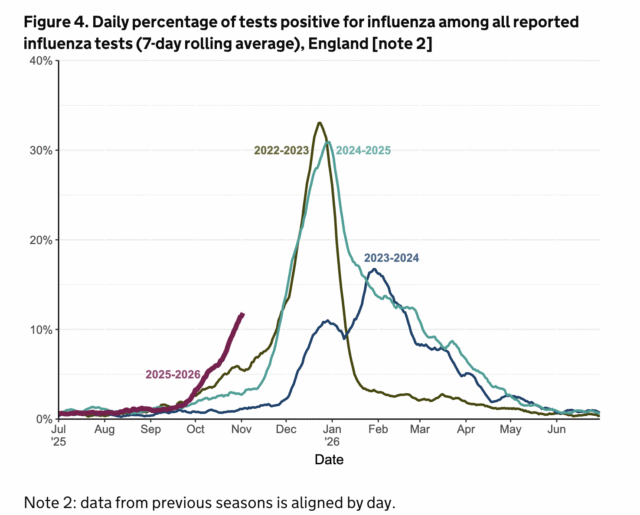Health officials in the United Kingdom are warning that this year’s flu season will be especially tough for the Northern Hemisphere — and the US is unprepared.
The gloomy outlook is driven by a new strain of H3N2, which emerged in the summer (at the end of the Southern Hemisphere season) with several mutations. Those changes aren’t enough to provoke the most severe conditions — a deadly pandemic — but they could help the virus evade immune responses, resulting in larger numbers of serious illnesses that could put significant pressure on hospitals and clinics.
In Britain, the virus has spread. Flu season in the region has started about five weeks earlier than usual and is progressing rapidly.

The UK flu season is in progress.
Credit: UKHSA
Jim Mackay, who became chief executive of NHS England in April, is bracing for an outbreak of influenza. “There is no doubt that this winter will be one of the toughest we have ever faced for our staff,” Mackay told the BMJ. “Since stepping into this role, I’ve been lying awake at night thinking about a long, protracted flu season. And, unfortunately, it looks like that fear is becoming a reality.”
According to the UK Health Protection Agency, almost all cases in Britain so far this year have been of the influenza A strain, with H3N2 accounting for the largest share. The two circulating influenza A strains are the new H3N2 strain and an H1N1 strain, with an influenza B strain circulating at a much lower rate. In the latest UK data, H3N2 was behind more than 90 percent of the influenza virus types analyzed.
“Of the two seasonal influenza A viruses, the current dominant circulating virus (A/H3N2) causes more severe disease than A/H1N1, particularly in older adults,” Antonia Ho, an infectious disease expert at the University of Glasgow, said in a statement. And the early start of flu season only makes things worse, because many people aren’t vaccinated early on, Ho said. “From past experience, influenza waves that start early tend to affect larger numbers of people in the population.”
